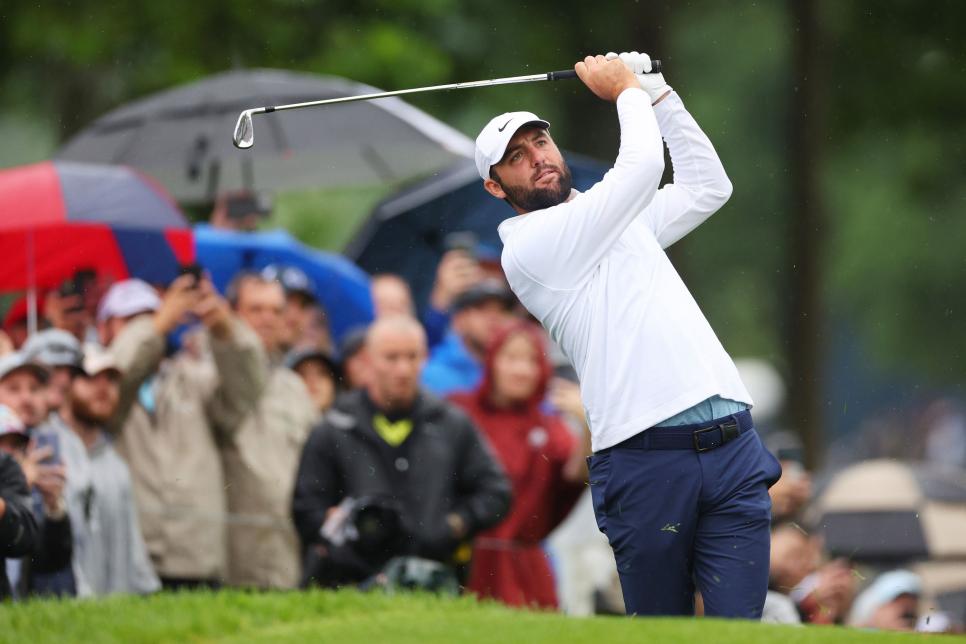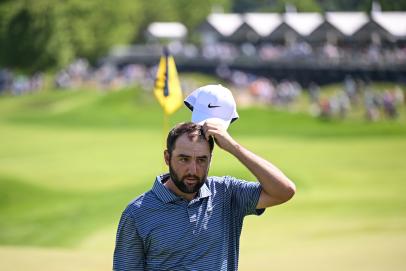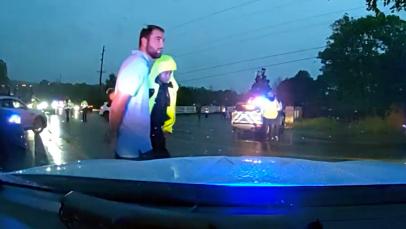Q&A
Scottie Scheffler arrest: Local lawyer weighs in on videos, latest developments—'He's not being treated like everybody else'

Andrew Redington
Shortly after Scottie Scheffler's May 17 arrest ahead of the second round of the PGA Championship, we contacted David Barber, a Kentucky attorney who has practiced for almost 30 years. Since graduating from law school at the University of Louisville, he's worked as a prosecutor, a criminal defense attorney, and now a civil lawyer, much of it in Louisville, where he lives and practices not far from Valhalla Golf Club. He knows the major officials involved in the case, including Michael O'Connell, the county attorney leading the prosecution, and Steve Romines, Scheffler's attorney. (He also happens to be an avid golfer who attended last week's Wednesday practice round at the PGA Championship.)
Barber gave us the inside scoop on what it all meant and where it was heading in the early hours of the incident, and we wanted to touch base with him again now that three significant developments have come out since our last conversation: 1) the motion hearing that postponed Scheffler’s arraignment from May 21 to June 3 and included a tense back-and-forth between O'Connell and Romines; 2) Thursday's press conference with Louisville mayor Craig Greenberg and chief of police Jacquelyn Gwinn-Villaroel; 3) and the release of two police videos from the incident, which you can watch in sequenced form here:
What follows is our Q&A with Barber as we try to figure out what just happened, and what it says about where this case is heading. It has been edited for clarity and length.
Golf Digest: Let's start with the new video footage released Thursday. What are you're seeing there?
Barber: Let's go to the dash cam video, just before 6:01 a.m. (time-stamped here), you'll notice a guy in the upper left corner who's waving his arm. He comes from behind the bus, you see him move to the left. This is like watching the Zapruder film or something. He's waving, and you interpret that immediately as he's waving somebody on. Right after that, you see headlights going to the other side of the bus, and that turns out to be Scottie’s [car]. Then [the car] comes around the front of the bus and into Valhalla, and that's where they stop him. The bus blocks everything that happens with [arresting officer Bryan] Gillis. That’s when you see him run up to the car in the pole cam [video], so whatever happens there is invisible. There's at least no video proof of him getting dragged on the ground. But that other officer waving the car through is important because it fits with the story that Romines has been saying, that Scottie was following directions. The video seems to bear that out.
It's also interesting that the crime scene from earlier is further down the road, and there's no westbound traffic at all that we can see. So the idea that Scheffler drove through a crime scene, or that he drove into oncoming traffic, which is misinformation that was out there, just isn't true. You can see that from the pole cam.
The other thing is that while the pole cam doesn't have audio, the dash cam should, and it's kind of odd that with all those cameras around there, all those cars, it looks like somebody edited that to take off the audio. Normally on a dash cam, you're going to hear all the radio traffic as well as any audio inside the vehicle, and you'd think that would be very interesting here. And what about body-cam footage from other officers?
I was going to ask you about that. Mayor Greenberg said they didn't have any known video of the actual incident, but that there is other video they're not showing at the county's request. What could that be?
It could be video from other cruisers there, it could be other body-cam footage, or it could be people with their phones held up to the window, that happens a lot in modern life. Valhalla might have cameras there.
But you take him at his word that there's no video of the original incident that seems to be blocked by the bus here?
Yes, absolutely. But that doesn't mean it might not show up.
Let's pretend nothing else shows up, this is all we get. Who benefits here? What changes?
Well, it puts us back into an old-fashioned case, relying on the perspective of witnesses, and ultimately if it went to trial a jury would decide who to believe. What's important to me, though, is that from everything I see here, it seems like it favors Scheffler more than the prosecution.
At Valhalla, he's supposed to get special treatment. They have these lanes for official vehicles, he's in an officially marked car, and if you're going to a U2 concert out at a stadium, you're going to expect there's a bit of priority to get U2 there, right? So these players are being told where to go, where to drive, and this is a tough place. This is a four-lane highway. And all players were getting special treatment, and Scheffler has a totally plausible version of what happened. Somebody waves him on. And this narrative that he's this really impatient guy who decides he's more important than anybody else and pulls into oncoming traffic through a crime scene, well, none of that actually happened. He's just trying to get to his entrance, and suddenly somebody is running next to his car. That's where we don't really know what happened, but not a lot could have happened because it's a really short period.
Back on Monday, at the motion hearing where Romines asked for the arraignment to be delayed until early June, it was tense between him and O'Connell, the county attorney. Was that strange?
This is supposed to be stuff we do literally every day in the court system. It shouldn't have been remarkable in any way. But based on what happened, the idea that they're treating Scottie Scheffler like anybody else is about as silly as me claiming I could have contended out at the PGA Championship on a 6 handicap. The fact that they objected to a motion just to postpone an arraignment date is weird. It's not like they're moving it to December, it's a matter of two weeks. As the judge herself said on the record, she does it frequently, it's about convenience for people. Here's somebody who was already released on his own recognizance, that's what ROR means. This is somebody the judge is looking at as, this is somebody we can trust to come back. Why would you care if we move it a couple weeks for people's schedules?
Even the idea of a county attorney himself coming to a routine motion to pass an arraignment is like Christmas being white in New Orleans, you know? The very fact that he's there at all means Scottie Scheffler's not being treated like anybody else. It's obviously not the case.
And what does that signify?
It's a really good question, and it's hard for me to say. Different people react differently to scrutiny. Let's say you're going out to eat at a good restaurant, and you happen to find out a famous food critic is going on the same night. That's a good thing, because you're thinking, that's going to make everybody do their job really well. I'm going to get a great meal. But people behave differently in those situations, and the fact of whatever the celebrity around the case and the tension around it is affecting how people are approaching their jobs and making them do odd things in what should be routine situations.
There were reports over the weekend that charges would be dropped. What did you make of that when you heard that speculation?
It doesn't seem weird to me that people would talk. It doesn't seem weird that people would think they know what's happening. But it would be rare for charges to be dropped that fast. You've heard how Romines has approached the case, it's all or nothing, there's no plea, either it gets dropped or we go to trial, because our position is he did nothing wrong. And that puts everyone against the wall. But the other thing is that more video could come out. You could have video supporting Detective Gillis' statements. It's looking less and less likely, but it's possible. And if I'm the prosecutor, and there's this bond between prosecutors and police, which there should be, we're going to take it seriously. I think people are just used to watching TV and legal dramas, where the beginning of the episode is the problem and then it's solved by the end.
Can O'Connell's relatively aggressive behavior over a non-issue at the motion hearing be explained by wanting to take a stance of publicly supporting his officers?
It definitely could be. And there was an interesting sound bite that came out of that about wanting to make sure Scheffler was treated like everybody else. But the truth is that he wasn't. But it was a good sound bite. It's sort of like coaching your own kid in sports, you don't want to bend over so far backwards in the direction of trying not to show favoritism that you treat him worse than everybody else, but you also don't want to show favoritism. It's a tough tightrope to walk. But it seems to me like in this case, O'Connell was bending over backwards in the wrong direction for Scheffler.
I think it backfires now because when you have a case like this, the best approach is just to make sure people handle it the normal way. Let the normal prosecutor handle it, and that shows we treat everybody the same. O'Connell being there was like the celebrity chef coming in when the food critic shows up.
What about Romine's "all or nothing" stance, where he won't accept a plea deal? Could that be a posture to put pressure on them, like if you want to pursue this, you better be ready to handle the scrutiny, because we're not backing down?
From time to time, clients will ask me, what are the odds of this settling? And my answer that has evolved over a lot of years is where I just say, I don't take cases anymore unless I'm ready to take it to trial. And I think Romines has that same mindset. I don't think it's posturing. You're writing for a sports publication so maybe the sports analogies work, but you don't come out planning for your opponent to miss the putt, you come out and plan on making his putt. I understand where Steve's coming from on this.
I asked you last time to put your prediction hat on. Has anything changed for you after this week?
People can change their minds, and that's a great thing that people should do more of. It goes back to Emerson's quote about how people adopt a position and stick with it regardless of what proof may come in, and those aren't the people we want in charge. So there's certainly a chance by June 3, when everything is considered, that somebody can make a different call. The officer can certainly have input into it. They don't have to dismiss it at the arraignment but they could. They could say no, we're going to proceed, at which point you get a probable cause hearing and then a grand jury that would decide if the felony charge get sent up to the circuit court.
But is it pretty fair to say that it's still hard to read the tea leaves here and predict the outcome?
It is, and this gets back to the point of, when a case starts getting attention, you hope people aren't going to do their jobs differently. But sometimes they do. And it's to the point now with the media attention that people can't meet in a room and say, hey, let's agree on what ought to happen here and do it without too many people paying attention. Lines have been drawn, people may need to save face. And that's why I say, let everybody act out of grace, and if somebody in this situation has the strong character to come forward and say, this has gone too far down the wrong path, three wrongs don't make a right, then that's somebody we should applaud.


